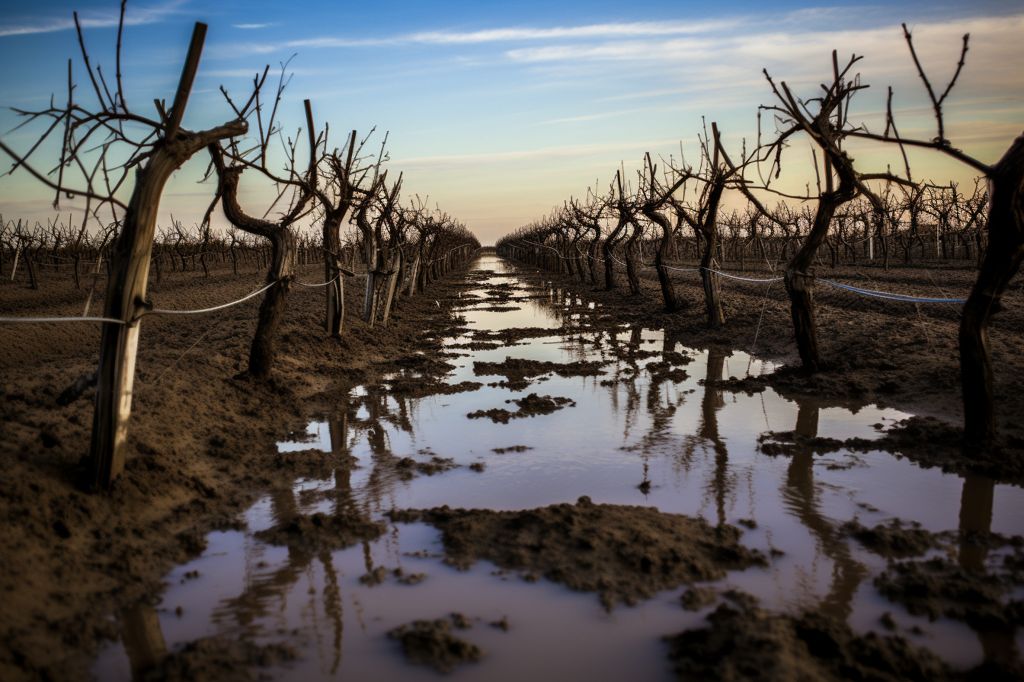The agricultural sector in the Western Cape region of South Africa has suffered extensive damage in recent storms, with preliminary estimates putting losses at R1.4 billion. The Cape Winelands region was hit particularly hard, with power supplies disrupted and agricultural workers facing an uncertain future. The South African National Defence Force has been requested to assist with repair and recovery efforts, but a lengthy process of rebuilding lies ahead.
Over the recent extended weekend, torrential rains and strong winds ravaged the Western Cape region, leaving a trail of destruction. The agricultural sector has suffered greatly, with preliminary estimates suggesting a staggering R1.4 billion in losses. In this article, we examine the affected areas, the scope of the damages, and the future of Western Cape’s farmers and agricultural workers.
The Wine Industry Takes a Hit: Cape Winelands Region
As of now, only about 20% of farms have been evaluated, but it seems that the Cape Winelands region has been hit hardest. Ashia Petersen from the provincial agriculture department stated that infrastructure damages in this area have already reached R250 million, with crop losses, mainly in citrus and vineyards, at R150 million. Given that this region is central to South African wine production, these losses will likely send shockwaves throughout the industry.
Storm’s Impact on Garden Route and Overberg Regions
The aftermath of the storm was not limited to the Cape Winelands, as both the Garden Route and Overberg regions also suffered significant damages. Preliminary estimates show that the Garden Route experienced R7 million in infrastructure damage and R25 million in crop losses. The Overberg region faced even more substantial losses, with R130 million in infrastructure damage and R30 million in crop losses.
Agricultural Workers Face Uncertainty
The storm’s impact on the agricultural sector goes beyond financial losses. The department has not yet assessed the effects on the region’s agricultural workers, a community that often struggles to make ends meet. With farms and crops destroyed, the livelihoods of numerous individuals are at risk.
Eskom Works to Restore Electricity
The severe weather conditions also disrupted the power supply in some areas. MEC for local government, Anton Bredell, acknowledged the problem and reassured that Eskom, the state-owned power company, is actively working to restore electricity to the affected areas. This restoration is essential for the recovery process and will allow impacted communities to start rebuilding their lives.
Seeking SANDF Assistance
In the face of widespread destruction, the provincial government has requested help from the South African National Defence Force (SANDF). With their expertise in bridge-building and engineering, as well as access to mobile bridges, the SANDF could provide much-needed support in repairing the region’s infrastructure.
Anton Bredell emphasized that they have specifically requested the SANDF’s help with the N2 highway. However, he warned that this assistance would not be immediate, as President Cyril Ramaphosa’s authorization is required for the process.
Weather Outlook
Thankfully, the weather forecast for the Western Cape looks more favorable in the coming days. Aside from a mild cold front expected on Friday, better weather is on the way. This improved forecast should offer some relief and create more favorable conditions for recovery efforts.
Charting the Path Forward
With only a small portion of the affected farms assessed, the true extent of the damage is yet to be determined. However, early estimates paint a distressing picture for the Western Cape’s agricultural sector. As farmers and workers struggle to cope with the aftermath of this extreme weather event, it is clear that a lengthy recovery process lies ahead.
The Western Cape government’s request for SANDF assistance, combined with Eskom’s efforts to restore power, demonstrates a commitment to supporting the affected communities. While the coming days and weeks may be filled with challenges, the resilience of the Western Cape’s agricultural sector will be crucial in overcoming this crisis and rebuilding the region’s agricultural foundation.
1. What is the estimated damage of the recent storms in the Western Cape region of South Africa?
Preliminary estimates suggest a staggering R1.4 billion in losses.
2. Which region was hit hardest by the storms in the Western Cape?
The Cape Winelands region was hit particularly hard, with infrastructure damages already reaching R250 million and crop losses mainly in citrus and vineyards at R150 million.
3. What are the estimated damages in the Garden Route and Overberg regions?
Preliminary estimates show that the Garden Route experienced R7 million in infrastructure damage and R25 million in crop losses. The Overberg region faced R130 million in infrastructure damage and R30 million in crop losses.
4. How has the storm impacted the agricultural workers in the Western Cape region?
The department has not yet assessed the effects on the region’s agricultural workers, a community that often struggles to make ends meet. With farms and crops destroyed, the livelihoods of numerous individuals are at risk.
5. Was the power supply disrupted in some areas due to the storm?
Yes, the severe weather conditions disrupted the power supply in some areas. Eskom, the state-owned power company, is actively working to restore electricity to the affected areas.
6. Has the Western Cape government requested help from other institutions for recovery efforts?
Yes, the provincial government has requested help from the South African National Defence Force (SANDF) for repairing the region’s infrastructure, specifically with the N2 highway.
7. What is the current weather outlook for the Western Cape?
Aside from a mild cold front expected on Friday, better weather is on the way. This improved forecast should offer some relief and create more favorable conditions for recovery efforts.
8. What is the path forward for the agricultural sector in the Western Cape?
The true extent of the damage is yet to be determined, but early estimates paint a distressing picture for the Western Cape’s agricultural sector. The Western Cape government’s request for SANDF assistance, combined with Eskom’s efforts to restore power, demonstrates a commitment to supporting the affected communities. A lengthy recovery process lies ahead, but the resilience of the Western Cape’s agricultural sector will be crucial in overcoming this crisis and rebuilding the region’s agricultural foundation.








